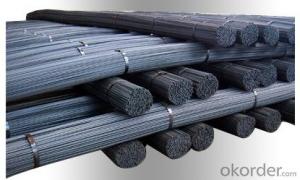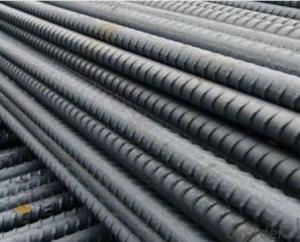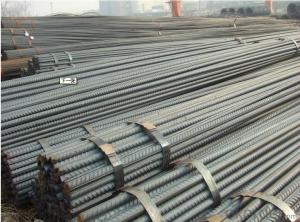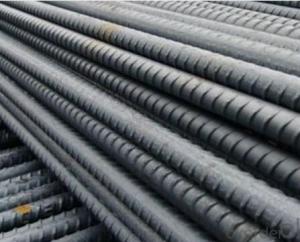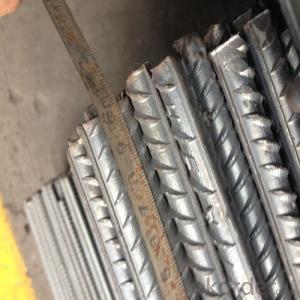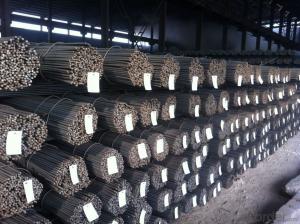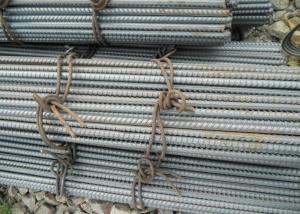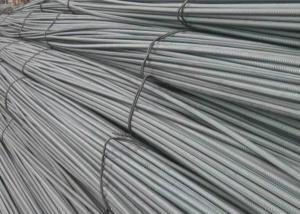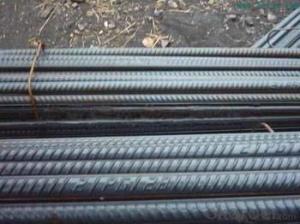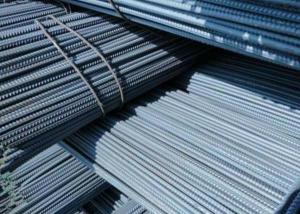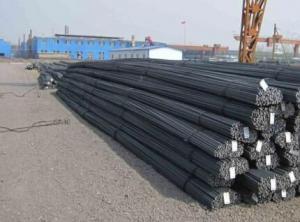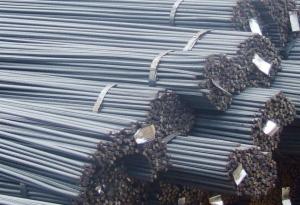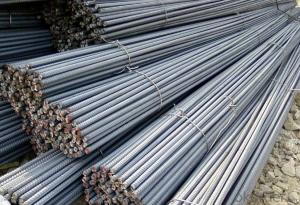GR40 deformed steel bar for construction
- Loading Port:
- Tianjin
- Payment Terms:
- TT OR LC
- Min Order Qty:
- 25 m.t.
- Supply Capability:
- 10000 m.t./month
OKorder Service Pledge
OKorder Financial Service
You Might Also Like
Product Description:
Theoretical weight and section area of each diameter as below for your information:
Diameter(mm) | Section area (mm²) | Mass(kg/m) | Weight of 12m bar(kg) |
6 | 28.27 | 0.222 | 2.664 |
8 | 50.27 | 0.395 | 4.74 |
10 | 78.54 | 0.617 | 7.404 |
12 | 113.1 | 0.888 | 10.656 |
14 | 153.9 | 1.21 | 14.52 |
16 | 201.1 | 1.58 | 18.96 |
18 | 254.5 | 2.00 | 24 |
20 | 314.2 | 2.47 | 29.64 |
22 | 380.1 | 2.98 | 35.76 |
25 | 490.9 | 3.85 | 46.2 |
28 | 615.8 | 4.83 | 57.96 |
32 | 804.2 | 6.31 | 75.72 |
36 | 1018 | 7.99 | 98.88 |
40 | 1257 | 9.87 | 118.44 |
50 | 1964 | 15.42 | 185.04 |
Usage and Applications of Construction
1. Construction steel round bar is mostly used for straight bundles supply, and used for steel, bolts and various mechanical parts. While the bigger round bar, or more than 25mm hot rolled bar, is mainly for the manufacture of mechanical parts or for seamless steel billet.
2. Steel round bar is used in construction and a large number of architectural and engineering structures.
3. Besides, we can supply some especial material steel round bar that can be used for main shaft of steamer, hummer shank, with big section and supper force.
Packaging & Delivery
Packaging Detail: All goods are packed in bundle with steel strips and shipped by break bulk vessel or container (depend on target market and different ports)
Delivery Detail: 45 days
Trade terms: FOB, CFR, CIF
MOQ: 25 tons per specification; we can negotiate the quantity if the specification is normal or we have stock of one specification.
Weight: Theprice invoicing on theoretical weight basis or actual weight basis depends on customer’s request.
Shipment: The shipment of bulk break or container is depends on customer’s request and the situation of the port of destination.
Documents given: Full set of original clean on board bill of lading; Original signed commercial invoice; Original packing list; Policy of insurance; Certificate of origin and what the target market needs.
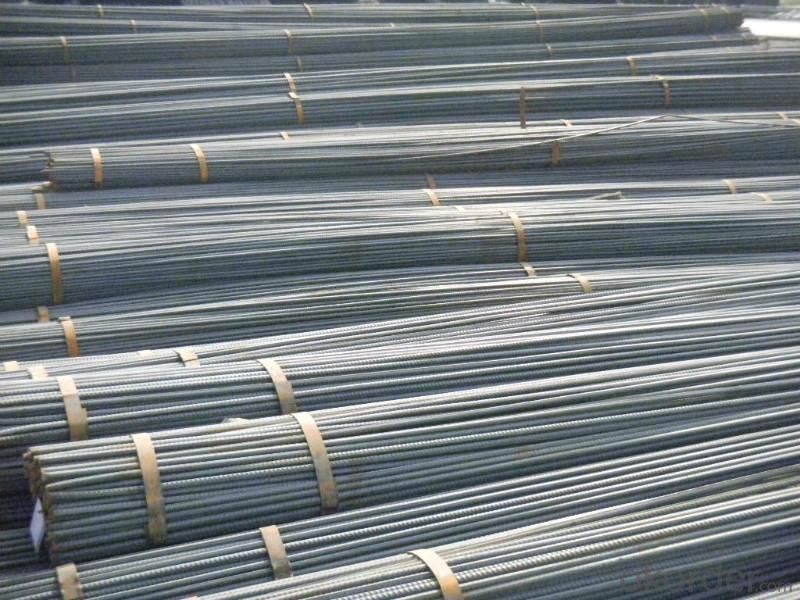
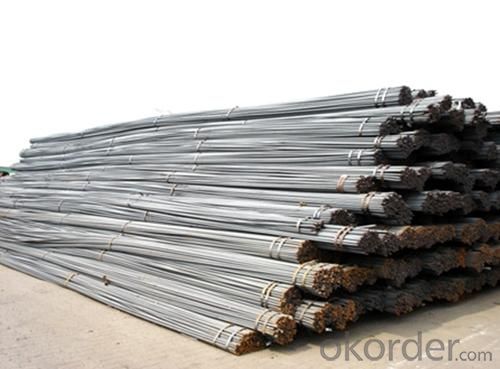
- Q:How much is the minus difference per ton of thread steel?
- H, R, and B are the first letters in English for hot-rolled (Hotrolled), ribbed (Ribbed) and reinforced (Bars) three words. Hot rolled ribbed bar is divided into HRB335 (old No. 20MnSi), HRB400 (20MnSiV, 20MnSiNb, veteran, 20Mnti), HRB500 three brands.
- Q:Can steel rebars be used in structures with aggressive chemical exposure?
- Steel rebars can be used in structures with aggressive chemical exposure, but their performance may be compromised depending on the specific chemicals involved. It is crucial to select the appropriate type of steel with corrosion-resistant properties or use protective coatings to prevent degradation and maintain structural integrity. Additionally, regular maintenance and monitoring are required to ensure the rebars' durability in such environments.
- Q:Can steel rebars be used in marine construction projects?
- Yes, steel rebars can be used in marine construction projects. They are commonly used for reinforcing concrete structures in marine environments due to their high strength, durability, and resistance to corrosion. However, proper protective measures such as coating or stainless steel rebars should be used to enhance their resistance against saltwater and prevent corrosion.
- Q:Can steel rebars be used in the construction of water treatment plants?
- Yes, steel rebars can be used in the construction of water treatment plants. Steel rebars are commonly used in reinforced concrete structures, including water treatment plants, to provide strength and durability to the overall construction. The rebars help to reinforce the concrete and provide structural support, making them suitable for the rigorous demands and environmental conditions of water treatment plants.
- Q:What are the guidelines for storing steel rebars on a construction site?
- When it comes to storing steel rebars on a construction site, there are several guidelines that should be followed to ensure safety and maintain the quality of the rebars. Here are some key guidelines: 1. Location: Select a designated area on the construction site that is flat, clean, and well-drained for storing the rebars. Avoid areas prone to flooding or excessive moisture. 2. Elevation: Keep the rebars off the ground by using wooden or concrete blocks to prevent direct contact with soil or water. This helps prevent rusting and corrosion. 3. Stacking: Stack the rebars in a stable manner, ensuring that they are aligned vertically and horizontally to maintain their shape and prevent any bending or warping. Use spacers or crates between layers to maintain proper spacing and prevent entanglement. 4. Protection from elements: Cover the rebars with a waterproof tarp or plastic sheet to protect them from rain, snow, or excessive sunlight. This helps prevent rusting and degradation of the rebars. 5. Separation: Store different sizes and types of rebars separately to avoid mixing or confusion during construction. Clearly label and mark each stack to identify the type, size, and grade of the rebars. 6. Accessibility: Ensure easy access to the rebars for construction workers by organizing them in a logical manner. Place smaller rebars on top for easy retrieval and avoid storing heavy rebars on top of lighter ones to prevent damage. 7. Safety precautions: Maintain a safe distance between the rebars and any heavy machinery or equipment to minimize the risk of accidents. Secure the rebars properly to prevent them from falling or causing injury. 8. Regular inspection: Regularly inspect the rebars for any signs of damage, rust, or corrosion. Replace or repair any damaged or compromised rebars to avoid compromising the structural integrity of the construction project. By adhering to these guidelines, construction sites can ensure the proper storage of steel rebars, promoting safety, efficiency, and the longevity of the rebars.
- Q:What is the effect of welding defects on the performance of steel rebars?
- The performance of steel rebars can be significantly affected by welding defects, which can weaken their structural integrity and compromise the overall strength and durability of the construction project. Porosity is one of the common welding defects, caused by the presence of gas pockets or voids in the weld. This weakens the weld joint, reducing its load-bearing capacity and making it more prone to cracking or breaking under stress. As a result, the rebars may not be able to resist external forces, such as the weight of the structure or seismic activities, potentially leading to collapse or structural failure. Another welding defect is lack of fusion, which happens when there is insufficient bonding between the base metal and the weld metal. This creates a weak joint that can easily separate or crack under load. Lack of fusion can decrease mechanical strength and compromise structural performance as the rebars may not be able to withstand the expected load or forces. Additionally, the presence of weld spatter or excessive weld reinforcement can also have a negative impact on the performance of steel rebars. Weld spatter refers to undesirable splashes or droplets of molten metal that can stick to the rebar's surface, creating potential weak points. Excessive weld reinforcement adds unnecessary weight to the rebar and creates stress concentrations, further increasing the risk of failure. In conclusion, welding defects can significantly affect the performance of steel rebars by weakening their structural integrity, reducing load-bearing capacity, and increasing the likelihood of cracking or breaking under stress. Therefore, it is crucial to implement proper welding techniques and quality control measures to minimize or eliminate these defects and ensure the safety and reliability of the construction project.
- Q:What is the effect of exposure to chemicals on steel rebars?
- Exposure to chemicals can have various effects on steel rebars depending on the specific chemical involved. Corrosive chemicals, such as acids or salts, can cause corrosion and weaken the steel rebars over time. This can compromise the structural integrity of reinforced concrete structures, leading to potential safety hazards. On the other hand, some chemicals like epoxy or protective coatings can be applied to steel rebars to enhance their resistance to corrosion and extend their lifespan. Overall, the effect of exposure to chemicals on steel rebars can range from degradation to protection, highlighting the importance of proper material selection and maintenance in construction projects.
- Q:How do steel rebars affect the overall seismic performance of buildings?
- Steel rebars play a crucial role in enhancing the overall seismic performance of buildings. They improve the structural integrity and strength of concrete, which is especially important during earthquakes. By reinforcing the concrete, rebars help to distribute the seismic forces more uniformly, reducing the likelihood of structural failure. Additionally, rebars increase the ductility and flexibility of the building, allowing it to absorb and dissipate seismic energy, thus minimizing the damage caused by the earthquake. Therefore, steel rebars significantly contribute to the improved seismic performance and safety of buildings.
- Q:Can steel rebars be used in tunnel construction projects?
- Yes, steel rebars can be used in tunnel construction projects. Steel rebars are commonly used as reinforcement in concrete structures, including tunnels. They provide the necessary strength and durability to withstand the loads and stresses that tunnels are subjected to. The rebars are typically placed within the concrete lining of the tunnel to enhance its structural integrity and prevent cracking or collapse. In addition, steel rebars can be easily shaped and bent to match the specific design requirements of the tunnel, making them a versatile and practical choice for tunnel construction projects.
- Q:Can steel rebars be used in precast concrete applications?
- Yes, steel rebars can be used in precast concrete applications. Precast concrete refers to a construction method where concrete elements, such as walls, slabs, or beams, are cast in a controlled environment before being transported to the construction site for installation. Steel rebars, which are typically made of carbon steel and have ribs on their surface to provide better adhesion to the concrete, are commonly used to reinforce precast concrete elements. The use of steel rebars in precast concrete applications offers several advantages. Firstly, the presence of rebars helps to increase the overall strength and durability of the precast concrete elements, making them capable of withstanding higher loads and reducing the risk of structural failure. Additionally, rebars also enhance the resistance of the precast elements to cracking and shrinkage, ensuring better long-term performance. Moreover, steel rebars facilitate the proper transfer of tensile forces within the precast concrete elements. While concrete has excellent compressive strength, it is relatively weak in tension. By incorporating rebars into the precast elements, the tensile forces generated during service can be effectively absorbed by the rebars, preventing cracks and ensuring the structural integrity of the element. Furthermore, steel rebars offer flexibility in design and construction. Precast concrete elements can be manufactured in a wide range of shapes and sizes to meet specific project requirements, and the inclusion of rebars allows for greater design freedom. It enables the creation of complex and intricate precast elements that can be customized to fit various architectural and structural designs. In conclusion, steel rebars are essential components in precast concrete applications. Their inclusion significantly enhances the strength, durability, and performance of precast concrete elements. With the ability to resist tensile forces and provide structural integrity, steel rebars play a vital role in ensuring the safety and longevity of precast concrete structures.
1. Manufacturer Overview |
|
|---|---|
| Location | |
| Year Established | |
| Annual Output Value | |
| Main Markets | |
| Company Certifications | |
2. Manufacturer Certificates |
|
|---|---|
| a) Certification Name | |
| Range | |
| Reference | |
| Validity Period | |
3. Manufacturer Capability |
|
|---|---|
| a)Trade Capacity | |
| Nearest Port | |
| Export Percentage | |
| No.of Employees in Trade Department | |
| Language Spoken: | |
| b)Factory Information | |
| Factory Size: | |
| No. of Production Lines | |
| Contract Manufacturing | |
| Product Price Range | |
Send your message to us
GR40 deformed steel bar for construction
- Loading Port:
- Tianjin
- Payment Terms:
- TT OR LC
- Min Order Qty:
- 25 m.t.
- Supply Capability:
- 10000 m.t./month
OKorder Service Pledge
OKorder Financial Service
Similar products
New products
Hot products
Related keywords
